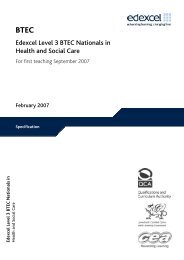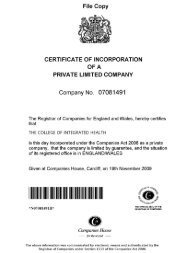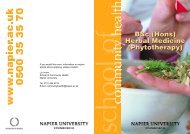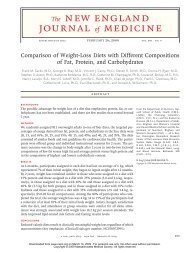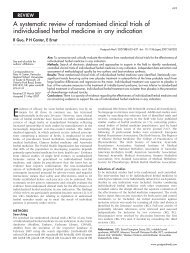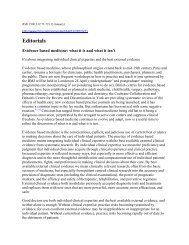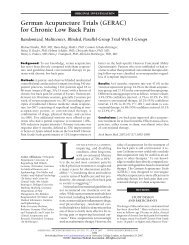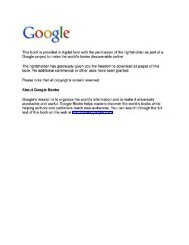Evidence Check 2: Homeopathy - Homeowatch
Evidence Check 2: Homeopathy - Homeowatch
Evidence Check 2: Homeopathy - Homeowatch
Create successful ePaper yourself
Turn your PDF publications into a flip-book with our unique Google optimized e-Paper software.
<strong>Evidence</strong> <strong>Check</strong> 2: <strong>Homeopathy</strong> 1968. Professor Ernst also commented on the BHA’s claims about reviews that offeredpositive reviews for allergies, 83 upper respiratory tract infections 84 and rheumatic diseases 85were equally flawed: the “review” on allergies was a lecture series, not a systematic review;the “reviews” on upper respiratory tract infections were health technology assessments, notsystematic reviews, and mostly contained uncontrolled data; and the “review” onrheumatic diseases was not conclusive. 86 Finally, he pointed out that the BHA had omittedseveral systematic reviews and meta-analyses, each of which “must have been known to theBHA” and “all of them arrived at negative conclusions”. 8769. The review which we consider the most comprehensive to date is that by Shang et al. 88The review compared 110 placebo-controlled trials of homeopathy matched according todisorder and type of outcome to trials of conventional medicine. The study only includedtrials that were controlled, included randomised assignment to treatment or placebogroups and were accompanied by sufficient data for odds ratio calculations. 89 The authorsconcluded that “when analyses were restricted to large trials of higher quality there was noconvincing evidence that homeopathy was superior to placebo”. 9070. In our view, the systematic reviews and meta-analyses conclusively demonstrate thathomeopathic products perform no better than placebos. The Government shares ourinterpretation of the evidence. We asked the Minister, Mike O’Brien, whether theGovernment had any credible evidence that homeopathy works beyond the placebo effectand he responded: “the straight answer is no”. 9171. We were troubled that the Chief Scientist at the DH seemed to be out of step with theaccepted scientific consensus on the question of efficacy. Unlike the Minister, 92 he did notagree that there was no credible evidence that homeopathy worked beyond the placeboeffect. He stated that “the majority of independent scientists feel that the evidence is weakor absent” 93 and that there are “real difficulties” in drawing conclusions on efficacy becauseof a “lack of agreement between experts working in the field”. 94 However, we could find no83 P Bellavite, R Ortolaini, F Pontarolo et al, “Immunology and homeopathy. 4. Clinical studies–Part 2”, eCAM, vol 3(2006), pp 397–40984 G Bornhöft, U Wolf, K von Ammon, M Righetti, S Maxion-Bergemann, S Baumgartner et al, “Effectiveness, safetyand cost-effectiveness of homeopathy in general practice–summarised health technology assessment”, ForschKomplementmed, vol 13 (Suppl 2), 2006, pp 19–29; and P Bellavite, R Ortolaini, F Pontarolo et al, “Immunology andhomeopathy. 4. Clinical studies–Part 1”, eCAM, vol 3 (2006), pp 397–40985 W B Jonas, K Linde,G Ramirez, “<strong>Homeopathy</strong> and rheumatic disease”, Rheum Dis Clin North Am, vol 26 (2000), pp117–12386 Ev 53, para 487 Ev 53, para 588 A Shang, K Huwiler-Muntener, L Nartey, P Juni, S Dorig, J A Sterne et al. “Are the clinical effects of homoeopathyplacebo effects? Comparative study of placebo-controlled trials of homoeopathy and allopathy”, Lancet, vol 366(2005), pp 726–73289 An odds ratio indicates how likely it is that an event will occur compared to likelihood that the event will nothappen. This can be used to show the strength of a relationship between treatment and outcome.90 Shang A et al, as above91 Q 17592 Qq 174–7593 Q 17694 Q 177



